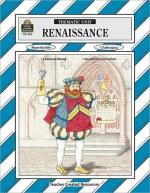|
This section contains 1,971 words (approx. 7 pages at 300 words per page) |

|
A Hybrid Economy. The period between 1350 and 1600 laid the foundation for the rise of Europe to economic predominance in the world. However, for much of the period, the actual economic progress of Europe was slow and inconspicuous. The economy was a hybrid of medieval and modern capitalist practices. The most important transformations often took place in the ordinary segments of the economy, such as in the organization of farming. The perception of society also remained fairly static throughout the era. Social and political power was in the hands of the nobility, who claimed their authority from service to society and superior "blood." Below this surface image of order there were tensions between the interests of the nobility and the "Third Estate," which included wealthy merchants and professionals, ordinary artisans, and the peasantry. Thus, the most significant economic and social events of the era are often far more obvious...
|
This section contains 1,971 words (approx. 7 pages at 300 words per page) |

|



